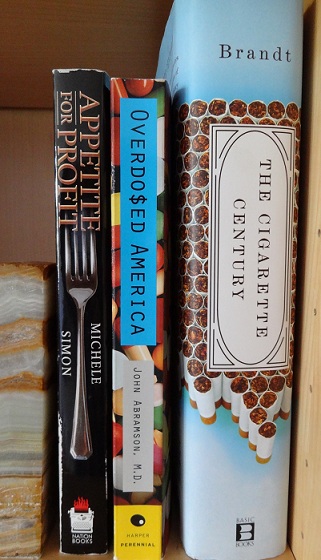Protecting Yourself Made Easy
The corporate takeover of health is here. You can see the results in soaring health care costs, millions felled by preventable illness, and acceptance of chronic disease as a way of life.
This post is the hundredth blog on my site. Myth-busting remains my specialty and whole foods, plant-based diets my passion. I’m celebrating by sharing with you three books that taught me how to spot corporate disinformation as easily as a keen-nosed dog can find smelly garbage. These models of myth-busting inspired me in writing The Perfect Formula Diet and still keep me going:
- The Cigarette Century: The Rise, Fall, and Deadly Persistence of the Product That Defined America; Allan M. Brandt, Ph.D.
- Appetite For Profit: How the Food Industry Undermines Our Health and How to Fight Back; Michele Simon
- Overdosed America: The Broken Promise of American Medicine; Dr. John Abramson
Here are insights from each book.
THE CIGARETTE CENTURY
While pretty much everyone these days admits cigarettes are unhealthy, what you might not know is the sordid history of the tobacco industry. These corporations pioneered underhanded methods to deliberately confuse and mislead consumers for decades while hundreds of thousands suffered agonizing deaths from lung cancer and heart disease.
I’m placing this book first in my list of myth-busters, since the food and drug industries make profitable use big tobacco precedents. Here is a sampling of tactics all three industries love (although big tobacco may be stymied in using some now):
- Sell product based on an attractive, phony image that has nothing to do with reality, and enlist celebrities to support that image (while today’s stars do not speak out for tobacco, there is no shortage of them willing to smoke on camera in movies)
- Create an appearance of caring and wholesomeness by sponsoring sporting or other desirable events
- Work to shape culture so their products fit right into people’s everyday lives
- Employ “scientists” who are willing to manufacture fake “controversy” over questions that have long since been settled by

You would not naturally want to consume something like this. But big tobacco knows how to sell it, leading to hundreds of thousands of deaths a year.
impartial research
- Attack anyone who dares to question the desirability of their products, often using industry front groups with friendly names
- Keep potential critics in line, using strategies such as industry-provided research grants, free “educational materials,” opportunities to speak at conferences or publish papers, peer pressure, and fear of the personal attacks they witness against others
- Create addictive products which are difficult for consumers to quit
- Convince physicians that their offerings support health, and use these busy doctors to push their products (remember the medical industry used to give away cigarettes, now they advise you to eat animal foods and take drugs)
- Fund powerful lobbies that convince politicians to follow the industry’s interests, not the public’s
- Create brands that, in reality, are almost identical but which are sold to consumers as unique to create brand loyalty
- Seek to expand their markets by migrating to every country where people have money
- Use cartoon images and other kid-appealing messages to indoctrinate children in the desirability of their product, then deny they are even targeting youth
- Reject all accountability for the harm they cause, citing individual choice to put the blame solely on the consumer
Allan Brandt, Ph.D. thoroughly documents tobacco industry tricks and tactics in The Cigarette Century. His style is highly readable, with lightning bolts of his anger creeping into the historical discussion. Big tobacco’s dirty tactics drew me into this book the way suspense in a murder mystery would. The difference is that, with cigarettes, real people died and are still dying. Dr. Brandt is a Harvard professor and Dean of the University’s School of Arts and Sciences.
APPETITE FOR PROFIT
Appetite for Profit’s anti-glossary of “corporate speak” shows how money-oriented industries create myths simply by imposing their own jargon on consumers. Here are a couple of highlights.
Better-for-you products: Processed-food companies way of describing self-defined nutritionally “superior” foods, using their worst

The food industry wants to convince you that its highly profitable junk foods can be part of a "balanced diet"
product as comparison.
Sound science: The objective-sounding way that food companies like to justify their opposition to any policy that would interfere with their bottom line. As in “We cannot act to remove soda and junk food from schools in the absence of sound science.”
The anti-glossary alone will put you far along the path to becoming a champion myth-buster yourself. The book gives you many tools to deflate food industry hype, for example by teaching you how to read an industry news release, spot worthless corporate “science,” and recognize government complicity.
Michele Simon, a public health attorney who is Appetite for Profit’s author, shares her passion, knowledge, and adventures behind enemy lines in this highly readable book. She lays out many examples of how the food industry puts their own success above anyone’s health, often using tactics that tobacco companies pioneered.
OVERDOSED AMERICA
After the tobacco and food industries have laid the groundwork, it’s time for drug companies to jump into action. The pharmaceutical industry seizes on the chronic illness created by cigarettes and unhealthy foods. These companies sell consumers on the idea that taking a pill is better than making a few simple lifestyle changes that would truly prevent and reverse disease.
Dr. John Abramson, a practicing physician and lecturer at Harvard Medical School, describes the many tactics drug companies use to skew research results and to hide findings they don’t like. Even scarier, the harmful and even fatal results of taking drugs can be suppressed for years while patients die of side-effects.
Dr. Abramson observes what he found when delving into drug company research. “Rigging medical studies, misrepresenting research results published in even the most prestigious medical journals, and withholding the findings of whole studies that don’t come out in a sponsor’s favor have all become the accepted norm in commercially sponsored medical research.” If you take any medications or care about anyone else who does, you must read this book.
When you put the evidence from these three myth-busting reads together, the conclusions are inescapable. Stay alert for fairy tales from big industry and government. Question everything you see in the media and cultivate the ability to distinguish image from facts. Enjoy life by staying healthy and vigorous, not by consuming addictive products that will age you long before your time. Learn to stay out of the clutches of the food and drug industries by eating a whole food, plant-based diet. Millions of other people make healthy choices every day, and you can certainly be one of them.
If you liked this posting, you may want to read Twelve Ways Animal Foods and Smoking Are Alike.
Intrigued? Now you can use our Whole Foods Blog Finder to target informative, fun postings on whole foods, plant-based nutrition. Quick information at no cost!
Blog posting by Janice Stanger, Ph.D. Janice authored The Perfect Formula Diet: How to Lose Weight and Get Healthy Now With Six Kinds of Whole Foods. This easy-to-follow eating plan is built on a whole foods, plant-based diet that can prevent, and even reverse, most chronic disease.
Tags: Allan Brandt, Appetite for Profit, cigarettes, Dr. John Abramson, drug industry, food industry, getting healthy, Janice Stanger, Michele Simon, Overdosed America, The Cigarette Century, tobacco industry, whole foods plant-based diet






